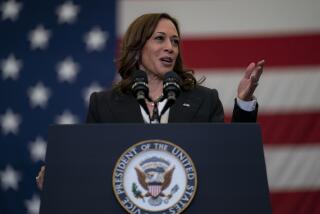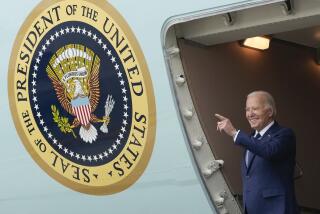Regional Primaries Can Make Sense of a Mess
- Share via
At their national convention this month, Democrats will consider for the fifth time in 20 years possible changes in their presidential nominating process. This time the changes are proposed by the Rev. Jesse Jackson, who wants to reduce the number of “super delegates” (elected and party officials) who can come unpledged to future conventions. He also wants to move the California and New Jersey primaries from the back to the front of the nominating process.
As with most such “reforms,” those proposing them are the ones who would benefit from them. Jackson, looking ahead to another possible candidacy in 1992, wants to reduce the power of unpledged super delegates because, as practical politicians focused on the electability of the nominee in the general election, they would be unlikely to vote for him. Jackson wants California and New Jersey moved to the front of the primary calendar because both have big minority populations and, therefore, a big Jackson vote.
If you talk privately to the presidential candidates and their managers, they will without exception tell you that the present nominating process both humiliates and degrades them. It does so because they must spend the majority of their waking hours doing two things that are absolute necessities for survival, yet which have little to do with seriously addressing the issues facing the country.
First, they must devote enormous time and attention to people who give and raise money. Since no single donor can give more than $1,000 and no political action committee more than $5,000--and since many millions of dollars are needed--money talks in presidential politics even more than elsewhere. (Gov. Michael S. Dukakis, the apparent 1988 Democratic nominee, ran a skillful campaign. Yet he would not have risen above the pack had the national Greek community and Massachusetts donors to his gubernatorial campaigns not provided him with more than twice as much early money as any competitor).
Second, candidates must shower comparable time and attention on a handful of key organizers in Iowa and New Hampshire--two unrepresentative states that nonetheless are do-or-die battlegrounds for any candidate wishing to enter the winners’ bracket in later, larger states. Since relatively few people vote in these two contests, the candidates find themselves in a bidding war for the loyalty of activists who are often more interested in some narrow litmus issue than in big cross-cutting issues such as economic growth and national security.
The candidates know full well that the present process is shortchanging both the American people and themselves.
There is no single, perfect alternative to the present system. There are some, often proposed, which would make it worse. A single, national presidential primary would be subject to exploitation by a demagogic, telegenic, well-financed candidate. The abandonment of many state primaries, and their replacement by caucuses or state conventions, would reduce citizen participation in a process already weakened by too little such participation. Changing the sequence of the contests, as Jackson proposes, by moving some states forward and others back, would only skew the process in favor of some single region or state. (We tried that this year with the Super Tuesday contests in the Southern and border states.)
The fairest alternative would be three or four regional primaries, spaced a month apart, which would expose the candidates to the issues and concerns of all parts of the country; would give no regional candidate a disproportionate advantage; and would signal to the American people that the game was honest. Such a system might, for instance, seem to offer an edge to a Southern candidate if a Southern regional primary were the first to be held, say in March. But, if voters knew that a Western primary was to follow in April, and an Eastern contest in May, they would carefully measure the candidates’ respective showings in all regions and discount a victory in one place.
Such a system, since it would cluster several states together in each contest, would avoid the tyranny of Iowa, New Hampshire, or any other single state upon the candidates or their agendas. Candidates would make pandering, localized appeals at their peril, knowing that any easy political promise made in one regional contest could destroy them in the next.
What about money? The only answer is to provide most of the federal matching funds at an early stage--before the first contest--to all those candidates who have raised a established minimum amount of their own funds in at least half the states. This would eliminate narrow, regional candidacies yet would assure that those qualifying could have a fair, national test. Spending limitations should be preserved.
Today the skills of one avid organizer in Iowa, or of a fat-cat fund-raiser able to make a single-issue or special-interest appeal, outweigh in the nominating equation the votes of millions of citizens in California and other states that hold their caucuses and primaries late in the process. It’s cynical and wrong. We ought to get it right once and for all.
More to Read
Get the L.A. Times Politics newsletter
Deeply reported insights into legislation, politics and policy from Sacramento, Washington and beyond. In your inbox twice per week.
You may occasionally receive promotional content from the Los Angeles Times.









